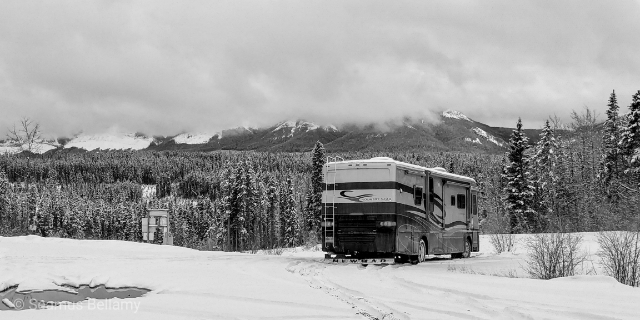
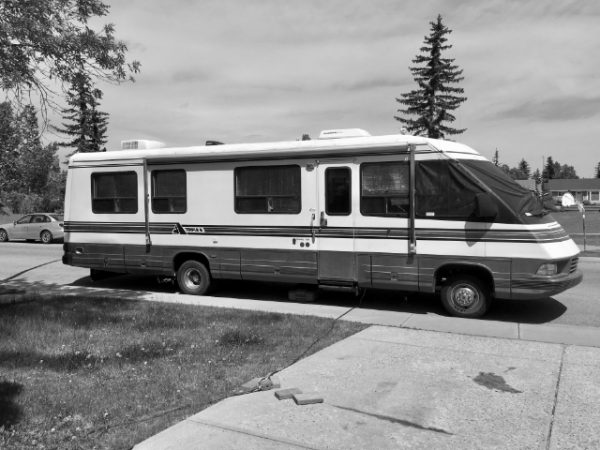 We were poor. Shortly before we were to make the rive over the mountains, I was informed that, after five years of service to a site that I had built, my services were no longer needed. It shattered me emotionally and financially. I was sent scrambling to find enough work, piecemeal, to make end's meet. There was cash coming in barely enough to keep afloat. Staying in a campground in the lower mainland costs around $800 per month. We couldn't foot the bill. We made do. Weekly, we would sneak into a local university sports complex for a shower. On one occasion, we had to decide between buying food or propane for heat. We chose food. This ended up costing us $1200, money that could have kept us going for months, to replace our hot water tank as it iced up and cracked in the cold. I had to ask my folks for help after that. It felt shitty.
We were poor. Shortly before we were to make the rive over the mountains, I was informed that, after five years of service to a site that I had built, my services were no longer needed. It shattered me emotionally and financially. I was sent scrambling to find enough work, piecemeal, to make end's meet. There was cash coming in barely enough to keep afloat. Staying in a campground in the lower mainland costs around $800 per month. We couldn't foot the bill. We made do. Weekly, we would sneak into a local university sports complex for a shower. On one occasion, we had to decide between buying food or propane for heat. We chose food. This ended up costing us $1200, money that could have kept us going for months, to replace our hot water tank as it iced up and cracked in the cold. I had to ask my folks for help after that. It felt shitty. We drove without taillights on our tow vehicle for a month, too poor to afford anything but fuses to try and troubleshoot the problem. In Vancouver, with its being Vancouver, no one wanted our RV parked anywhere near their homes. We moved regularly, parking in industrial areas, parking lots and other less than savory locales. We found a driveway that we could park in and use the homeowner's electricity for $300 a month. It was an upgrade. It was also short lived. No one in the neighborhood wanted us there. After a couple of month's of fighting with bylaw enforcement, we admitted defeat. Miraculously, we landed on our feet: dear friends with a bit of property outside of the city invited us to stay with them. In the spring, we returned to Alberta, warmth and, with my partner going back to work, a measure of financial stability. 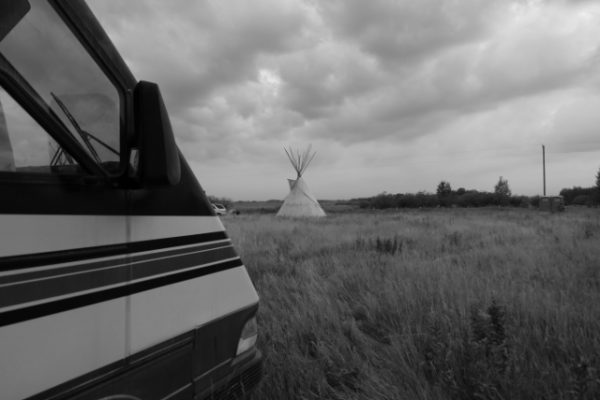 Despite the shitshow that the fall and winter of 2015/2016 had been, we were absolutely hooked on RV living. The sense of freedom, even in hardship that being able to move your home, anywhere, at any time, affords, is intoxicating. More than this, I've always found that travel helps me feel more grounded and capable of dealing with the symptoms that come with my PTSD diagnosis. New places and experiences occupy me, force me to interact with the outside world and keep me from turning inward. So we decided this would be the thing: for half the year, my wife would work her gig as a drug rehabilitation counselor in Alberta. The other half we'd spend on the road, living somewhere warm. I'd continue to write, building my business back up and support us in our travels. By heading into Mexico, my partner would be able to find work for our six months outside of Canada as a Dive Master.
Despite the shitshow that the fall and winter of 2015/2016 had been, we were absolutely hooked on RV living. The sense of freedom, even in hardship that being able to move your home, anywhere, at any time, affords, is intoxicating. More than this, I've always found that travel helps me feel more grounded and capable of dealing with the symptoms that come with my PTSD diagnosis. New places and experiences occupy me, force me to interact with the outside world and keep me from turning inward. So we decided this would be the thing: for half the year, my wife would work her gig as a drug rehabilitation counselor in Alberta. The other half we'd spend on the road, living somewhere warm. I'd continue to write, building my business back up and support us in our travels. By heading into Mexico, my partner would be able to find work for our six months outside of Canada as a Dive Master. 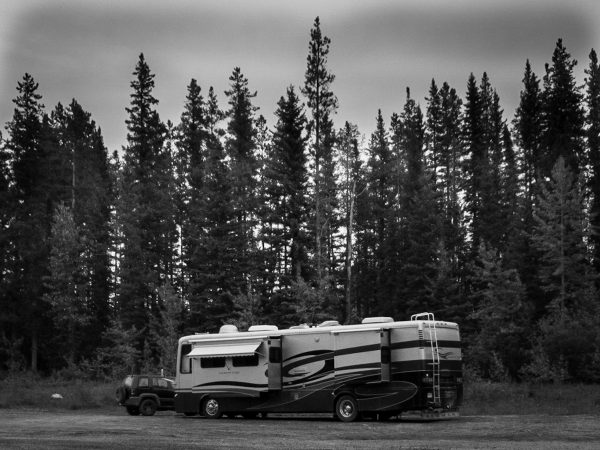 Just before the time to make the drive south was due to hit, we agreed to take over the payments on my mother and her husband's motorhome: a 40-foot diesel pusher. It's a big rig that requires an air brake certification to drive. With four slide outs to increase our living space, a diesel generator to run all of our systems while we're away from shore power and an inverter that allows me to power everything I need for work while we're on the road, our new RV is an upgrade to what we were living in, in every imaginable way.
Just before the time to make the drive south was due to hit, we agreed to take over the payments on my mother and her husband's motorhome: a 40-foot diesel pusher. It's a big rig that requires an air brake certification to drive. With four slide outs to increase our living space, a diesel generator to run all of our systems while we're away from shore power and an inverter that allows me to power everything I need for work while we're on the road, our new RV is an upgrade to what we were living in, in every imaginable way. 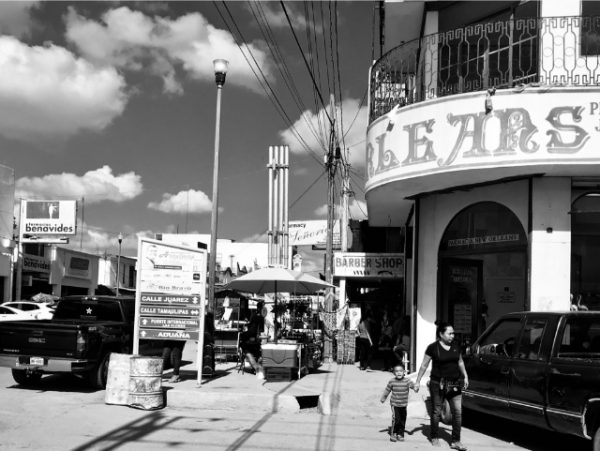 Last winter, money was tight again. But not so tight that we were uncomfortable. We were able to roll through the vast and varied environments that south Texas and Mexico have to offer. We reveled in Mexican cuisine and culture. Our shitty Spanish skills received an upgrade. Along the way, we were subjected to incredible acts of kindness on both sides of the United States southern border. We saw far too many examples of cruelty and extreme poverty. The latter made us feel that our complaints from the previous winter were unfounded. My partner and I married while we were in Texas, surrounded by a small group of family and new friends. Our time south was everything we'd hoped for.
Last winter, money was tight again. But not so tight that we were uncomfortable. We were able to roll through the vast and varied environments that south Texas and Mexico have to offer. We reveled in Mexican cuisine and culture. Our shitty Spanish skills received an upgrade. Along the way, we were subjected to incredible acts of kindness on both sides of the United States southern border. We saw far too many examples of cruelty and extreme poverty. The latter made us feel that our complaints from the previous winter were unfounded. My partner and I married while we were in Texas, surrounded by a small group of family and new friends. Our time south was everything we'd hoped for. 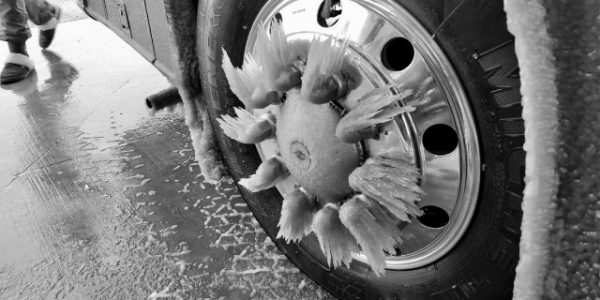 In early April, it was time to return north once again. To make more money. To ensure that we'd maintain our right to Alberta's healthcare system by actually living there for a while and, most importantly, to prepare for our next trip south. This year, thanks to our home's massive freshwater, grey/black water holding tanks and other upgraded systems, we were able to spend six months living entirely off the grid in the wilds of north central Alberta. The quiet was astonishing. So were the mosquitos. With September in play, we're looking to run from the snows once more. This year, we may go south to revisit friends, family and delve deeper into Mexico. With the promise of a dive job on Vancouver island, we might return to British Columbia, unbroken by our last stretch of time in the province and better equipped to face any challenges that may be waiting for us. I look forward to the movement: to the miles traveled, to sunsets in places freshly discovered. Every mile traveled demands attention for fear of missing something splendid. I'll share what we find along the way. All photos via Séamus Bellamy
In early April, it was time to return north once again. To make more money. To ensure that we'd maintain our right to Alberta's healthcare system by actually living there for a while and, most importantly, to prepare for our next trip south. This year, thanks to our home's massive freshwater, grey/black water holding tanks and other upgraded systems, we were able to spend six months living entirely off the grid in the wilds of north central Alberta. The quiet was astonishing. So were the mosquitos. With September in play, we're looking to run from the snows once more. This year, we may go south to revisit friends, family and delve deeper into Mexico. With the promise of a dive job on Vancouver island, we might return to British Columbia, unbroken by our last stretch of time in the province and better equipped to face any challenges that may be waiting for us. I look forward to the movement: to the miles traveled, to sunsets in places freshly discovered. Every mile traveled demands attention for fear of missing something splendid. I'll share what we find along the way. All photos via Séamus Bellamy


